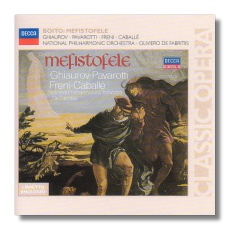
The Internet's Premier Classical Music Source
Related Links
- Boito Reviews
- Latest Reviews
- More Reviews
-
By Composer
-
Collections
DVD & Blu-ray
Books
Concert Reviews
Articles/Interviews
Software
Audio
Search Amazon
Recommended Links
Site News
 CD Review
CD Review
Arrigo Boito

Mefistofele
Montserrat Caballé, soprano
Luciano Pavarotti, tenor
Nicolai Ghiaurov, bass
National Philharmonic Orchestra/Oliviero de Fabritiis
Decca Classic Opera 475666-6
Boito's only completed opera has never managed to capture the public's imagination. Likewise, studio recordings are also at a premium with the most enduring being an early Decca taping with Mario del Monaco and Julius Rudel's equally fine studio account on EMI. This attitude simply baffles me, as the opera portrays the struggle between good and evil in a strong and dramatic way. It is full of memorable tunes, particularly the choruses, and the singers have to be really on their toes to tackle the score which is chock a block full of technical difficulties. A considerable amount of good quality acting is also required if the work is to succeed.
Decca recorded the opera twice as already indicated with this digital version dating from 1984. Although I believe it is interpretatively inferior to the first (Cesare Siepi as Mefistofele is unsurpassable), it is superior in both sound and balance. And to assemble artists of the likes of Ghiaurov, Pavarotti, Freni and Caballé is certainly no mean feat. All four were in their best voice, and this recording is a testimony to their art and dedication. Ghiaurov is a dark and brooding Mefistofele but when needs be he is also able to produce a seducing timbre. Pavarotti and Freni give to Faust and Margherita that youthful freshness that captivates the listener. Their Act 2 duet is heart wrenching with subtle vocal nuances confirming two great singers on true top form.
Caballé as Elena gives a sensuous interpretation, albeit in a minor role. The choruses in this opera are of paramount importance, as they represent the most important beings who are unseen; the heavenly hosts and the evil spirits. The London Opera Chorus and Trinity Boys Choir give a shimmering performance, full of beauty and majesty as well as menace (especially in the finale to Act 2). And so it should be as they are supposed to be singing from heaven and hell. Oliviero de Fabritiis keeps everything flowing with grace and panache without sacrificing the dramatic tension of the work. An experience to cherish, if not everyone's cup of tea but surely mine.
Copyright © 2005, Gerald Fenech


















